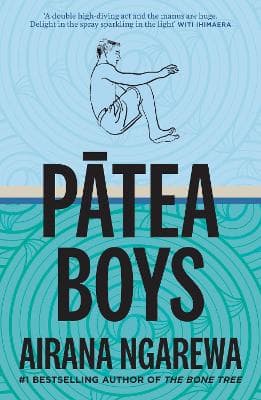Review: Pātea Boys, by Airana Ngarewa
Reviewed by Isla Huia
In Pātea Boys, Airana Ngarewa delivers a series of powerful and poignant narratives that delve into the heart of a small Māori community on the South Taranaki coast. Capturing the wairua of Pātea and its inhabitants, Ngarewa weaves characters throughout the short stories to leave us at the end with a complete kete, the whole whakapapa of a place. With Pātea Boys in the front half of the book, and Ngāti Pātea on the flip side, we are given the opportunity to hear the stories of Pātea in both English, and in its own native tongue, te reo Māori. Regardless of which end one starts from, in either language, Ngarewa’s storytelling is lyrical and evocative, offering us a window into a world rich with culture and history; of afternoons at the local pool, and of knowing everybody from the lifeguards to the cops as ‘aunty.’ It’s this familiarity, this nostalgic picture that Ngarewa paints of rural life at the pā, at school, at nan’s house; that is what makes up the essence of this book, and that is what makes it the taonga that it is.
A key component of this wairua, in both Pātea Boys and Ngāti Pātea, is humour. Whether it’s the rangatahi making fun of each other or the mokos rolling their eyes at the ways of their elders, each story in this collection makes room for the comical aspects of life in Pātea, ngā ‘āhua o Māui’ shining through in the cheeky comebacks and whispered retorts of the characters. For Māori readers, or those who’ve spent time under the korowai of te ao Māori, it’s these quips and laughs that will make you feel at home in this book; grateful not just for another publication by a kaituhi Māori, but for one that reminds you so vividly of this world that we know - where the happenings at the marae can be comparable to an episode of Shortland Street, or when aunty threatens that if you don’t do as you’re told, she’ll chuck you in the hāngī next!
“It’s a karakia kai, old man, not a kauhau. Wrap it up.”
On the other hand, this humour is also how Ngarewa breaks from the more challenging aspects within these lives. In no sense does he shy away from home truths, instead finding ways to carve out space for light, and dark. From the adults drinking at the pub to someone’s son who’s still locked up, from the loneliness of the pā to the confiscation of a whole coast’s whare wānanga; from near death experiences to a long-standing grudge - Ngarewa puts the spotlight on the horrors of history and the intergenerational consequences still felt so intimately as a result of that suffering. This too, brings the reader closer to the bones of Pātea, as do the small but mighty works the characters do to regain what was lost; a waka dug up, a language learned, a feud forgiven. It is these elements combined, in perfect (might I say, Māori) harmony, that make Pātea Boys a collection to be remembered.
“It’s a good time to be a Māori, I reckon, bub. A fricken good time to be a Māori.”
As is the case with so many Māori stories, from the pūrākau of ngā wā o mua to the modern tales of today, Pātea Boys has an innate focus on people and on Pātea. The tāngata, the whenua, and in turn, the tāngata whenua. Despite the fictional events and characters in the book, Ngarewa himself hails from the very place that these events occur, which adds another inherently Māori element to these stories. They are not written by someone who is on the outside looking in, but from the perspective of a ‘Pātea boy’ himself. With all the lingo, the reo, and the wairua that can only be so well described by someone who knows a place like the back of his own hand, it’s clear that Turi, Charity, and the myriad aunties may be fictional on the page, but the essence of their kōrero is true to the bone.
Reviewed by Isla Huia
